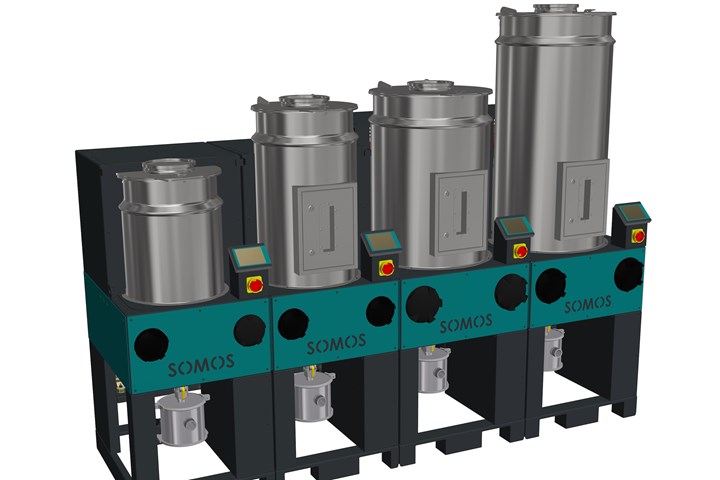Drying: Modular Drying System Provides Flexibility
ProTec’s SOMOS RDF modular resin drying system, which consists of units with their own dry-air supply and controllers, to debut at K.
ProTec Polymer Processing will introduce its SOMOS RDF modular resin drying system at K 2019, saying it offers flexible stationary use without a central dry-air generator. The system consists of individual operating units with their own controllers and dry-air supply, which depending on desired throughput, can be combined into a variable overall system with central visualization and control.

Depending on the required throughput, the modular stationary SOMOS RDF resin drying system can be made up of a number of independently operating drying module
The dryers are available with capacities from 50 to 400 liters and drying temperatures of 60 to 140 C—high-temperature models up to 180 C are available. When interconnected, the modules can be managed with a common operator control. Each module has an integrated air generator. ProTec says that compared to a central drying system, SOMOS RDF takes up less space and has simplified installation since it doesn’t require extensive supply and return air piping.
The PLC-based controller, which ProTec describes as Industry 4.0-capable, can store up to 200 formulations. To boost energy-saving, the system’s drying air volume is automatically adapted to actual throughput while regeneration cycles are controlled on the basis of the actual water content of the pellets. The SOMOS RDF system will be part of a production cell at the company’s K stand.
Related Content
-
Bozzelli’s Guide To Specifying a Dryer
Here's a list of 17 things to do when looking for new drying equipment.
-
How to Effectively Reduce Costs with Smart Auxiliaries Technology
As drying, blending and conveying technologies grow more sophisticated, they offer processors great opportunities to reduce cost through better energy efficiency, smaller equipment footprints, reduced scrap and quicker changeovers. Increased throughput and better utilization of primary processing equipment and manpower are the results.
-
ACS Group Adds Regional Sales Manager
Richard Gutierrez named Southwest regional sales manager.





